Budapest Vacation Service...Budapest Ghetto - Members of the Clergy
During the dark days of 1944 and 1945, there were many people who were willing to risk their lives to save the victims of the Nazi terror in Budapest. This page is dedicated to some of those heroes, who between them helped to save the lives of tens of thousands of Budapest's Jewish population.
www.budapestvacationservice.com email: info@budapestvacationservice.com tel: +36 30 5559678
Copyright ©2009, All rights reserved
Monsignor
Angelo Rotta (1872-1965), was assigned as papal nuncio (ambassador) to Budapest, later to become the Dean of the
diplomatic corps in Budapest. At the time of his assignment in Budapest in 1944, Monsignor Rotta was 72 years old.
Angelo Rotta actively protested the deportation and murder of Hungarian Jews and appealed to the authorities "not to continue this war against the Jews beyond the limits prescribed by the laws of nature and the commandments of God." Rotta also put pressure on the Catholic primate of Hungary, Cardinal Seredi, to issue a pastoral letter denouncing the deportations, which he did on June 29, 1944. Rotta issued hundreds of safe conduct certificates to Jews held in labor camps, at deportation centres and during death marches, often distributing these personally before the very eyes of the SS.
During his time in Budapest, Rotta and his assistant, Father Gennaro Verolino, issued more than 15,000 safe conduct certificates to the Jews of Budapest, putting them under the direct protection of the Vatican neutrality. They also set up numerous safe houses throughout Budapest.
Monsignor Angelo Rotta was responsible for saving several thousand lives and was recognized by Yad Vashem and awarded the title of Righteous Among the Nations by the State of Israel in 1997 and in 2010, a school in Budapest's 12th. district was named after Gennaro Verolino.
Angelo Rotta actively protested the deportation and murder of Hungarian Jews and appealed to the authorities "not to continue this war against the Jews beyond the limits prescribed by the laws of nature and the commandments of God." Rotta also put pressure on the Catholic primate of Hungary, Cardinal Seredi, to issue a pastoral letter denouncing the deportations, which he did on June 29, 1944. Rotta issued hundreds of safe conduct certificates to Jews held in labor camps, at deportation centres and during death marches, often distributing these personally before the very eyes of the SS.
During his time in Budapest, Rotta and his assistant, Father Gennaro Verolino, issued more than 15,000 safe conduct certificates to the Jews of Budapest, putting them under the direct protection of the Vatican neutrality. They also set up numerous safe houses throughout Budapest.
Monsignor Angelo Rotta was responsible for saving several thousand lives and was recognized by Yad Vashem and awarded the title of Righteous Among the Nations by the State of Israel in 1997 and in 2010, a school in Budapest's 12th. district was named after Gennaro Verolino.
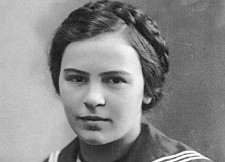
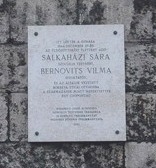
Sara Salkahazi in her teenage years
Wall Plaque at the place of execution (above) on the banks of the Danube.
Click to see larger image
Click to see larger image
Gabor Sztehlo (1909– 1974) was a Hungarian Lutheran pastor, and in 1944 was appointed to represent the Lutheran church in a Calvinist-led Protestant organization (Good Shepherd), responsible for providing food and clothing to Jews. In co-ordination with the International Red Cross and the Swiss Red Cross he established 32 homes in Budapest for Jewish children, and provided documents, stating that the children were Gentiles and thereby saving them from deportation or execution.
According to official information, Gabor Sztehlo was responsible for saving the lives of 2,000 Jewish persons - 1,600 children and 400 adults.
In 1973, Gabor Sztehlo was the first Hungarian to be receive an award from the Yad Vashem Institute, naming him a Righteous Among the Nations and the following year he was nominated by the Swiss authorities for the Nobel Peace Prize.
After the war had ended, he continued to care for the children whose families had perished.
He also established a school and provided facilities for teaching trades to these children.
In 1951 this home was taken over by the communist regime.
According to official information, Gabor Sztehlo was responsible for saving the lives of 2,000 Jewish persons - 1,600 children and 400 adults.
In 1973, Gabor Sztehlo was the first Hungarian to be receive an award from the Yad Vashem Institute, naming him a Righteous Among the Nations and the following year he was nominated by the Swiss authorities for the Nobel Peace Prize.
After the war had ended, he continued to care for the children whose families had perished.
He also established a school and provided facilities for teaching trades to these children.
In 1951 this home was taken over by the communist regime.
Gabor Sztehlo
Memorial plaque at the Becsi Kapu Evangelist Church in the Buda Castle area
Click to enlarge
Click to enlarge
Monsignor Angelo Rotta
Safe conduct certificate signed by Angelo Rotta. Click to enlarge
Heroes of the Hungarian Holocaust - Members of the Clergy
This page is dedicated to the members of the clergy who risked their lives, and in the case of Sister Sarah Salkahazi, sacrificed her life, to save the lives of others.
Between them they were responsible for saving thousands of Budapest's Jews from deportation to Nazi extermination camps or death by the Hungarian Arrow Cross.
This page is dedicated to the members of the clergy who risked their lives, and in the case of Sister Sarah Salkahazi, sacrificed her life, to save the lives of others.
Between them they were responsible for saving thousands of Budapest's Jews from deportation to Nazi extermination camps or death by the Hungarian Arrow Cross.
Click to see Heroes of the Hungarian Holocaust - Diplomats and Officials
Also visit our Budapest Great Synagogue,The Glass House and Budapest Ghetto pages
Also visit our Budapest Great Synagogue,The Glass House and Budapest Ghetto pages
Statue dedicated to Gabor Sztehlo at Deak Square in the centre of Budapest and below, enlargement of the inscription at the base of the statue.
Commemorative wall plaque at Angelo Rotta's office in the Budapest Castle district.
Click image to enlarge.
Click image to enlarge.
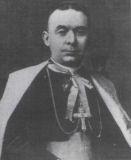
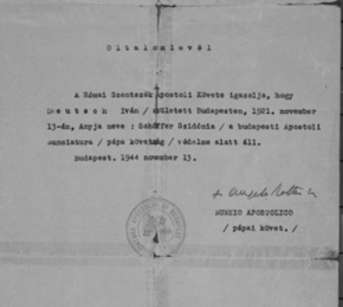

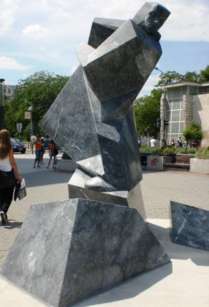
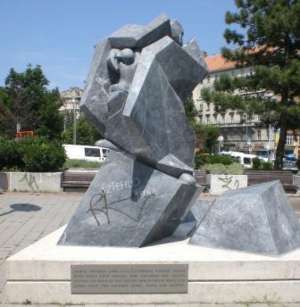

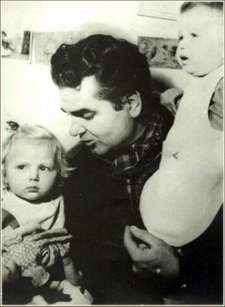
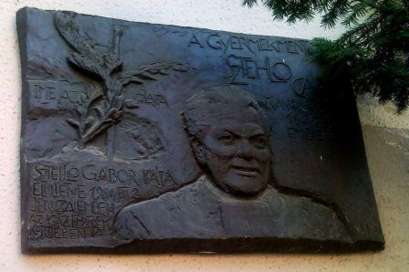

Sztehlo family tombstone at the Farkasreti Cemetery, the largest cemetery on the Buda side of the city.
Click image to enlarge
Click image to enlarge
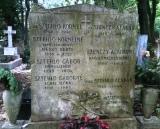
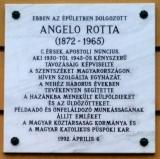
Sara Salkahazi (1899-1944), sheltered hundreds of Jews in a building belonging to the Sisters of Social Service in Budapest during 1944. Eventually she was denounced to the authorities by a woman who worked in the building, which was then raided by the Hungarian Arrow Cross. The Jews sheltering there were arrested. When Sarah Salkahazi heard of this raid, she returned to the building and was also arrested.
During the trial of former Arrow Cross members in 1967, it was learned that Sara Salkahazi, along with the Jews who were arrested, was executed by the Arrow Cross at the banks of the River Danube on 27. December 1944.
Sara Salkahazi was responsible for saving several hundred lives and accordingly was recognized by Yad Vashem and awarded the title of Righteous Among the Nations by the State of Israel in 1972.
In September 2006, during a Mass outside St. Stephens Basilica in Budapest, Sara Salkahazi was beatified in a proclamation by Pope Benedict XVI, read by Cardinal Peter Erdo, where it was said, "She was willing to assume risks for the persecuted in days of great fear. Her martyrdom is still topical and presents the foundations of our humanity."
Also attending the ceremony, Rabbi Jozsef Schweitzer said, "I know from personal experience how dangerous and heroic it was in those times to help Jews and save them from death. Originating in her faith, she kept the commandment of love until death."
During the trial of former Arrow Cross members in 1967, it was learned that Sara Salkahazi, along with the Jews who were arrested, was executed by the Arrow Cross at the banks of the River Danube on 27. December 1944.
Sara Salkahazi was responsible for saving several hundred lives and accordingly was recognized by Yad Vashem and awarded the title of Righteous Among the Nations by the State of Israel in 1972.
In September 2006, during a Mass outside St. Stephens Basilica in Budapest, Sara Salkahazi was beatified in a proclamation by Pope Benedict XVI, read by Cardinal Peter Erdo, where it was said, "She was willing to assume risks for the persecuted in days of great fear. Her martyrdom is still topical and presents the foundations of our humanity."
Also attending the ceremony, Rabbi Jozsef Schweitzer said, "I know from personal experience how dangerous and heroic it was in those times to help Jews and save them from death. Originating in her faith, she kept the commandment of love until death."